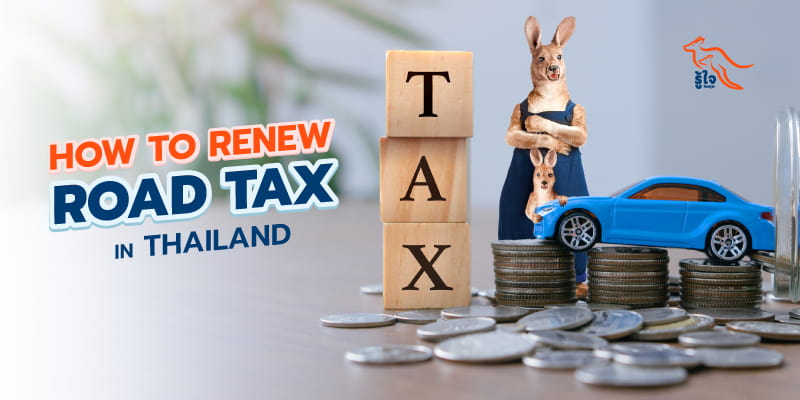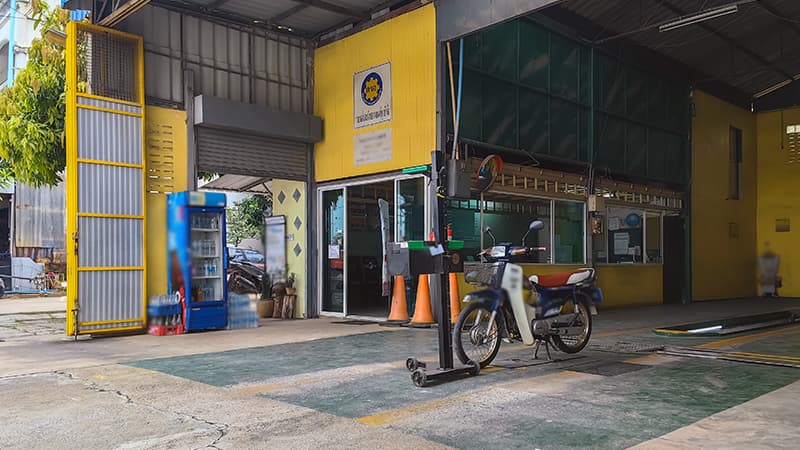
Road tax renewal is a mandatory obligation for all vehicle owners in Thailand. This requirement ensures legal compliance and supports the ongoing development of the nation’s transportation infrastructure. This comprehensive guide covers the essential information for renewing your vehicle tax in Thailand.
What is road tax?
Road tax, also known as vehicle tax, is a statutory fee imposed by the government on all motor vehicles, including cars, motorcycles, and commercial trucks. The tax rate is calculated based on vehicle classification, specifications, and engine capacity. Timely payment is required to maintain valid vehicle registration and prevent legal complications.
Why do we need to pay road tax?
Money collected from road tax goes toward maintaining and upgrading road networks, making travel safer and more efficient. Regular payment also ensures vehicles pass required inspections, which helps control pollution and protect the environment. Driving a vehicle without valid road tax is illegal and can lead to fines, penalties, or even impoundment.
Step-by-step guide to renewing car tax in Thailand
Renewing your road tax in Thailand involves several key steps. Here’s a detailed guide to help you through the process:
Step 1: Buy compulsory insurance (Por Ror Bor)
Before you can renew your road tax, you must purchase compulsory motor insurance, known as Por Ror Bor. This insurance covers basic third-party liability in case of accidents. You can buy Por Ror Bor from insurance companies, banks, or directly at the Department of Land Transport (DLT) offices when you’re registering your vehicle.
In addition to compulsory insurance, it’s advisable to consider purchasing private insurance for more comprehensive coverage. Private insurance can offer additional protection, such as coverage for vehicle damage due to natural disasters, theft, and personal injury attained during an accident. Having both types of insurance ensures you are fully protected and compliant with legal requirements.
Step 2: Go through a vehicle inspection
If your vehicle is older than the specified age, it must pass a vehicle inspection, known as Tor Ror Or, before you can renew the road tax. This inspection ensures that your vehicle meets safety and emission standards. The inspection fee is usually around THB 200 to 500, depending on the inspection centre and the type of vehicle. The requirements differ for cars and motorbikes:
- Cars: If your car is older than seven years, it must undergo a vehicle inspection. The inspection typically includes checks on brakes, lights, emissions, and overall vehicle condition.
- Motorbikes: If your motorbike is older than five years, it must also pass a vehicle inspection. The inspection for motorbikes includes similar checks to those for cars, ensuring the vehicle is roadworthy and meets emission standards.
You can get your vehicle inspected at authorised inspection centres, which can be identified by their official logo: a yellow gear on a blue circle.

Step 3: Pay annual taxes
Once you have your compulsory insurance and, if necessary, your vehicle inspection certificate, you can proceed to pay your annual road tax. The road tax renewal can be done online through the DLT e-service website, or you can visit your nearest DLT office, post office, or authorised bank to pay your road tax in person.
You would need these documents to renew your road tax in Thailand:
- Vehicle registration book (blue book)
- Compulsory insurance certificate (Por Ror Bor)
- Vehicle inspection certificate (if applicable)
- Payment receipt (if renewing online)
Step 4: Receive your road tax sticker
After completing the payment, you will receive a road tax sticker, which must be displayed on your windshield. If you renew your road tax online, the sticker will be mailed to your registered address. Ensure that you place the sticker in a visible location to avoid fines and penalties during vehicle inspections.
Cost of road tax in Thailand
The cost of road tax in Thailand varies based on the type and size of your vehicle, as well as its engine capacity. Here’s a detailed breakdown of the average costs:
Cars
- Engine capacity up to 600cc: About THB 600 per year.
- Engine capacity from 601cc to 1,800cc: Ranges from THB 1,000 to 3,000 per year.
- Engine capacity above 1,800cc: Can go up to THB 7,000 per year.
Motorcycle
- Engine capacity up to 150cc: Approximately THB 100 to 300 per year.
- Engine capacity above 150cc: Around THB 300 to 1,000 per year.
Trucks & commercial vehicles
- Light trucks: Typically around THB 1,000 to 3,000 per year.
- Heavy trucks: Costs can range from THB 3,000 to 10,000 per year, depending on the weight and engine size.
CO₂-based excise tax
Starting in 2026, Thailand will introduce a fixed excise tax rate based on how much carbon dioxide (CO₂) a vehicle emits per kilometer. This replaces the old system where tax rates increased by 2% each year.
- Vehicles emitting <100g CO₂/km: Excise tax rate of 6%
- Vehicles emitting 101–120g CO₂/km: Excise tax rate of 9%
For Mild Hybrid Electric Vehicles (MHEVs):
- <100g CO₂/km: Excise tax rate of 10%
- 101–120g CO₂/km: Excise tax rate of 12%
These changes applies from 2026 to 2032, and may influence future road tax costs depending on vehicle type and emissions.

Car tax renewal tips for foreigners
Renewing road tax in Thailand can be challenging due to language barriers and unfamiliar procedures. However, with proper preparation and a clear understanding of the required steps, you can make the process much smoother and more efficient. Here are some essential tips to guide you through the renewal process:
- Ensure you have your vehicle registration book, compulsory insurance certificate (Por Ror Bor), and vehicle inspection certificate if needed.
- If you’re not fluent in Thai, consider bringing a Thai-speaking friend or hiring a translator to assist at the DLT offices.
- Begin the renewal process early to avoid last-minute issues and potential fines. If your vehicle requires an inspection, book an appointment in advance.
- Use the DLT e-Service for renewing road tax online and making payments to save time.
- Keep up with any changes in road tax regulations or procedures through the DLT website or local news sources.
- The process may take some time, especially if there are long queues at the DLT offices. Be patient and polite, respecting local customs and practices can help you go through the process more smoothly.
Ready to renew your road tax?
If you ever decide to buy a car in Thailand or ride your own motorbike, it’s important to stay on top of your road tax and always renew it on time. Besides planning for car tax and compulsory insurance, it’s wise to prepare for unexpected events like car accidents, natural disasters, or theft as these situations can be financially draining.
Voluntary insurance helps reduce your financial risk by covering repair costs, medical expenses, and even bail costs if you’re at fault. At Roojai, we offer insurance that can save you up to 30% and you can get a quote in just 5 minutes.
Keep up with the latest news, expat guides, insurance tips, and more by following Roojai on Facebook. You can also connect with us on LINE by adding our official ID: @roojai.
Frequently asked questions about road tax renewal in Thailand
What happens if I don’t renew my car tax on time?
Failing to renew your car tax in Thailand on time can result in fines and penalties. Additionally, your vehicle may be impounded if caught driving without a valid road tax.
Is road tax renewal linked to vehicle insurance?
Yes, renewing road tax is linked to having valid vehicle insurance. You must provide proof of insurance when renewing your road tax. Your car or motorcycle insurance are often renewed along with the road tax around the same time. If your road tax is overdue, it might complicate the renewal process for your insurance, especially if your insurer requires proof of valid road tax for policy renewal.
What happens if my vehicle doesn’t pass inspection?
If your vehicle doesn’t pass the inspection, you must first repair any defects identified during the inspection. After making the necessary repairs, return for a re-inspection within 15 days, usually at half the original fee. Until your vehicle passes the inspection, you won’t be able to renew your road tax, as you need the Tor Ror Or certificate.




